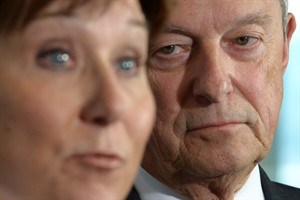
British Columbia Premier Christy Clark and Education Minister Peter Fassbender talk about the ongoing teachers' dispute at a news conference in Vancouver, Wednesday, Sept.3, 2014. THE CANADIAN PRESS/Jonathan Hayward
Republished September 03, 2014 - 5:38 PM
Original Publication Date September 03, 2014 - 10:20 AM
VANCOUVER - British Columbia's premier chastised the teachers' union and urged its members to cast aside strike action on Wednesday, inciting a defensive response from the teachers' federation.
Christy Clark stood beside her education minister and outlined her view of the steps required to get the situation rolling towards resolution in what was her first public address about the brewing dispute since the strike indefinitely shuttered schools.
Teachers must suspend the strike while the two sides negotiate, so that children can immediately start their school year, and the union must alter and introduce a "reasonable" proposal at the bargaining table, she said.
"The only ones who can end this strike or suspend it is the teachers' union," she told reporters. "If we really want to put students first and we really care that kids are at the top of the agenda, we'll all make sure they're in school tomorrow."
Clark promised that if the conditions were met, the government would start discussing what she began characterizing as the "single most important issue" for her, classroom size and composition. That could only happen if the union ended its bid to obtain benefits in the contract like an extra day off for high school teachers, unlimited massages and a $5,000 signing bonus, she said.
"As long as we're there, it makes it impossible for us to get to the things that I think really matter to parents...," she said.
Two hours later, B.C. Teachers' Federation president Jim Iker accused the government of going to great lengths to make it appear the gap between the sides was a massive gulf and vowed strikers would march the lines until they got movement from the government.
He said Clark was "mistaken" in her portrayal of the union's demands, noting several items had already been taken off the table, and described the government's $375 million interim offer for dealing with special needs in the classroom as "status quo" because it would only be used to hire teachers previously laid off due to cuts.
He reiterated the union's proposal for two new multimillion dollar funds to hire more teachers and deal with grievances as the only way to rectify the problem, while saying the union was still willing to bargain on the exact amounts.
"Is fixing a system that's been underfunded for 12 years expensive? Yes, of course it is," he told reporters at a news conference, before adding his own jabs. "But the government needs to rethink its priorities and put kids first. If they can build a roof on BC Place for half-a-billion dollars or give a private power company in California $750 million, we can afford to invest in our children."
Iker provided his own list of the roadblocks to getting a settlement: that government has been unwilling to engage in bargaining talks, that its negotiators have offered no counter-proposals in spite of the union's concessions and the insistence on keeping a clause in the contract that the union believes negates its bargaining rights.
He said the strike could end if the B.C. Public School Employers' Association, the government's bargaining arm, dropped "E80," a clause that he describes as overriding provisions related to class size and composition, a right the union already established in two B.C. court decisions.
The union frequently cites the B.C. Supreme Court decisions, now on appeal by the government, that ruled its rights to negotiate those issues were illegally removed by government legislation in 2002.
Clark introduced that legislation when she was B.C.'s education minister and said Wednesday it was imperative the animosity against her be dropped so all sides could move forward.
"This isn't good for anybody. We all have to get past the emotion here," she said. "We need to put this in the context of today, and today, kids are out of school."
Teachers mounted rotating strikes for three weeks last May and attempted to heighten pressure with a full-scale strike in June, ejecting half-a-million students from the classroom. Picketing teachers are getting no strike pay after the union coffers ran dry.
No new talks are scheduled.
Follow @TamsynBurgmann on Twitter
News from © The Canadian Press, 2014